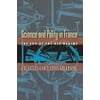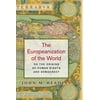Updated On April 16th, 2025
Looking for the best European History Books? You aren't short of choices in 2022. The difficult bit is deciding the best European History Books for you, but luckily that's where we can help. Based on testing out in the field with reviews, sells etc, we've created this ranked list of the finest European History Books.
| Rank | Product Name | Score | |
|---|---|---|---|
| 1 |

|
Genoa and the Genoese, 958-1528 (Paperback)
Check Price
|
0%
|
| 2 |

|
Science and Polity in France: The End of the Old Regime, (Paperback)
Check Price
|
0%
|
| 3 |

|
The Dreyfus Affair: A Chronological History, (Paperback)
Check Price
|
0%
|
| 4 |

|
The Contested Parterre (Paperback)
Check Price
|
0%
|
| 5 |

|
The Europeanization of the World (Hardcover)
Check Price
|
0%
|

Our Score
Set in the middle of the Italian Riviera, Genoa is perhaps best known as the birthplace of Christopher Columbus. But Genoa was also one of medieval Europe's major centers of trade and commerce. In Genoa and the Genoese, 958-1528, Steven Epstein has written the first comprehensive history of the city that traces its transformation from an obscure port into the capital of a small but thriving republic with an extensive overseas empire. In a series of chronological chapters, Epstein bridges six centuries of medieval and Renaissance history by skillfully interweaving the four threads of political events, economic trends, social conditions, and cultural accomplishments. He provides considerable new evidence on social themes and also examines other subjects important to Genoa's development, such as religion, the Crusades, the city's long and combative relations with the Muslim world, the environment, and epidemic disease, giving this book a scope that encompasses the entire Mediterranean. Along with the nobles and merchants who governed the city, Epstein profiles the ordinary men and women of Genoa. Genoa and the Genoese, 958-1528 displays the full richness and eclectic nature of the Genoese people during their most vibrant centuries. "A milestone in medieval Italian history. . . . This book is a must read for specialists of medieval and early modern Italy, and highly recommendable to anyone interested in the period.--Sixteenth Century Journal "A learned and intriguing book. . . . It is necessary reading for anyone interested in getting a better view of the historical evolution of the European economy and polity.--Journal of Economic History "Genoa's history is notoriously intricate, but Steven Epstein has produced order out of chaos; this is a work of lasting value, thoughtful, scholarly, and also readable.--David Abulafia, Cambridge University "Genoa and the Genoese holds the promise of becoming the history of medieval Genoa in the foreseeable future.--Benjamin Z. Kedar, The Hebrew University of Jerusalem In this comprehensive history of Genoa, Steven Epstein traces the city's transformation from an obscure port into the capital of a small but thriving republic with an extensive overseas empire. His story bridges six centuries of medieval and Renaissance history, interweaving political events, economic trends, social conditions, and cultural accomplishments. Profiling the ordinary men and women of Genoa as well as the nobles and merchants who governed the city, Epstein captures the full richness and eclectic nature of the Genoese people during their most vibrant centuries.
Genoa and the Genoese, 958-1528 (Paperback)

Our Score
By the end of the eighteenth century, the French dominated the world of science. And although science and politics had little to do with each other directly, there were increasingly frequent intersections. This is a study of those transactions between science and state, knowledge and power--on the eve of the French Revolution. Charles Gillispie explores how the links between science and polity in France were related to governmental reform, modernization of the economy, and professionalization of science and engineering.
Science and Polity in France: The End of the Old Regime, (Paperback) Author: Princeton University Press ISBN: 9780691118499 Format: Paperback Publication Date: 2004-07-26 Page Count: 616

Our Score
Volume one of a comprehensive series on the Dreyfus Affair, this account chronicles for the first time in English and day by day, the drama that destabilized French society (1894-1906) and reverberated across the world. A deliberate miscarriage of justice, the public degradation of an innocent Jewish officer and his incarceration on Devil's Island, espionage, intrigue, media pressure, vehement antisemitism and political skulduggery - topics so relevant to our times - are set within a broad historical context. Meticulous research, new translations of key documents, a wealth of primary sources and illustrations and a select bibliography make this an indispensable reference work.
The Dreyfus Affair: A Chronological History, (Paperback) Author: Palgrave MacMillan ISBN: 9780230202856 Format: Paperback Publication Date: 2005-10-12 Page Count: 526

Our Score
In the playhouses of eighteenth-century France, clerks and students, soldiers and merchants, and the occasional aristocrat stood in the pit, while the majority of the elite sat in loges. These denizens of the parterre, who accounted for up to two-thirds of the audience, were given to disruptive behavior that culminated in full-scale riots in the last years before the Revolution. Offering a commoner's eye view of the drama offstage, this fascinating history of French theater audiences clearly demonstrates how problems in the parterre reflected tensions at the heart of the Old Regime.Jeffrey S. Ravel vividly depicts the scene in the parterre where the male spectators occupied themselves shoving one another, drinking, urinating, and confronting the actors with critiques of the performance. He traces the futile efforts of the Bourbon Court--and later its Enlightened opponents--to control parterre behavior by both persuasion and force. Ravel describes how the parterre came to represent a larger, more politicized notion of the public, one that exposed the inability of the government to accommodate the demands of French citizens. An important contribution to debates on the public sphere, Ravel's book is the first to explore the role of the parterre in the political culture of eighteenth-century France.
The Contested Parterre (Paperback)

Our Score
The Europeanization of the World puts forward a defense of Western civilization and the unique gifts it has bequeathed to the world-in particular, human rights and constitutional democracy-at a time when many around the globe equate the West with hubris and thinly veiled imperialism. John Headley argues that the Renaissance and the Reformation provided the effective currents for the development of two distinctive political ideas. The first is the idea of a common humanity, derived from antiquity, developed through natural law, and worked out in the new emerging global context to provide the basis for today's concept of universal human rights. The second is the idea of political dissent, first posited in the course of the Protestant Reformation and later maturing in the politics of the British monarchy. Headley traces the development and implications of this first idea from antiquity to the present. He examines the English revolution of 1688 and party government in Britain and America into the early nineteenth century. And he challenges the now--common stance in historical studies of moral posturing against the West. Headley contends that these unique ideas are Western civilization's most precious export, however presently distorted. Certainly European culture has its dark side--Auschwitz is but one example. Yet as Headley shows, no other civilization in history has bequeathed so sustained a tradition of universalizing aspirations as the West. The Europeanization of the World makes an argument that is controversial but long overdue. Written by one of our preeminent scholars of the Renaissance and Reformation, this elegantly reasoned book is certain to spark a much-needed reappraisal of the Western tradition.
The Europeanization of the World (Hardcover)